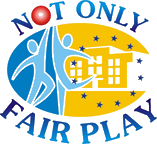
- Home
- Best
Practices - Toolkits
How to ... - Sport
Events - Guidelines
- Information
& Contacts - Project Management
A collection of student stories and initiatives about sport.
This section offers access to a collection of toolkits to promote sport at school.
-
 Physical Education Teachers
They are the main point of reference for students at school
Physical Education Teachers
They are the main point of reference for students at school
-
 Teachers
Teachers of all subjects can contribute to promote sport at school
Teachers
Teachers of all subjects can contribute to promote sport at school
-
 School Directors
Their support is a key element to promote sport at school
School Directors
Their support is a key element to promote sport at school
-
 Resources
A database of resources for teachers, PE teachers and school directors for the promotion of sport at school.
Resources
A database of resources for teachers, PE teachers and school directors for the promotion of sport at school.
Sporting events are organised in each partner country
Guidelines for policy makers willing to raise awareness on the importance of promoting sport in schools
Events
The Not Only Fair Play project has been promoted through conferences and articles.
Partnership
-
 Contractual Partners
From this section it is possible to access a description of each contractual partner of the Not Only Fair Play project.
Contractual Partners
From this section it is possible to access a description of each contractual partner of the Not Only Fair Play project.
-
 Schools
From this section it is possible to access information about the schools involved in the Not Only Fair Play Project in the 9 European countries involved.
Schools
From this section it is possible to access information about the schools involved in the Not Only Fair Play Project in the 9 European countries involved.
-
 Associated Partners
A number of associated partners officially joined the project in order to ensure the project sustainability by continuing to use the project deliverables over the next years.
Associated Partners
A number of associated partners officially joined the project in order to ensure the project sustainability by continuing to use the project deliverables over the next years.
This section of the Not Only Fair Play portal provides administrative information for the project contractual partners and for the European Commission, and is password protected.
School Directors
Homepage > Toolkits > School Directors

Their support is a key element to promote sport at school
Back to the School Directors Toolkits
How to Support Students to Balance Sport and Study at School
School Directors
Explain to the parents the reasons behind the students’ behaviour and choices (e.g. sleep, nutrition, schedules, time spent on school and on sports, parents’ involvement, etc.). Create an open and confident relationship between parents, students and school.
Discussions with the parents could address the following topics:
• Organising the student’s schedule
A sport activity in complement to the regular school path is for children a factor of intellectual and psychological balance. The sport activity needs to find its place in the child’s schedule, it needs to be perceived by the child as leisure time, not as an additional duty in an already busy schedule.
• Clarifying the stakes of both education and sport
Not all athletes can make a living from sport, it is therefore dangerous to make it the focus of regular education. Explain to the student that only being in the service of one’s school studies the sport they practice will be useful. As long as the child cannot be a professional athlete, parents should give priority to their school path, congratulating the child on their good marks or encouraging them to give priority to school.
• Downplaying the consequences of failure
In case of a bad result in sport, remind the child that practice makes perfect, as long as they do not let go.
• Making links between sport training and intellectual activities
Sport can often be used to explain students the meaning of homework or the need to persevere even when you do not understand at once (see examples in Step 1).
- Case studies on “Not Only Fair Play”A collection of interviews with students who explain how they manage to balance sport and education, what support they receive, especially from their parents
- Etudes et sport: comment aider son enfant à concilier les deux? (web site in French)A French article addressed to parents on how to help their child balance sport and education.
- Home-school cooperation in basic education (only in Finnish)Official recommendations for the cooperation between school and parents made by the National Board of Education in Finland
- Example of home-school cooperation in Tornio (only in Finnish)A case example of the cooperation between school and parents in Tornio, Finland, with supporting documents


